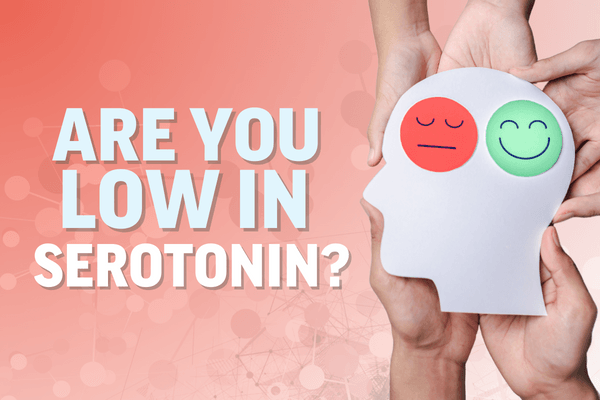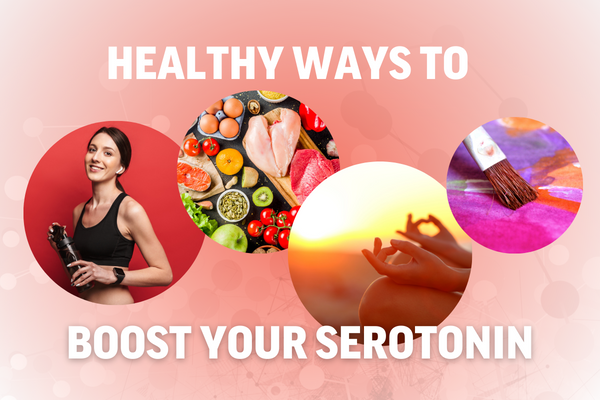
ARE YOU LOW IN SEROTONIN?

Ever feel those moments when you're just not yourself - feeling down, low on energy, and struggling to find the get-up-and-go? Maybe work's got you on a constant energy drain, or you may be wrestling with anxiety, and dealing with lack of sleep. You may think that it's common and just part of our crazy, fast-paced lives, but for some, this heavy-hearted vibe sticks around, messing with the overall quality of life.
If you're in that space right now, you might be wondering what's up with your body or why you're riding this emotional rollercoaster. One potential contributor could be a dip in your serotonin levels.
This article is designed to help you identify signs of lower serotonin levels and offers practical advice on what steps to take if you find yourself in this situation.
What is serotonin?
Serotonin is a neurotransmitter[1] , which is a chemical messenger that transmits signals in the brain. Most of the serotonin hangs out in our belly[2] and brain. In our brain, it helps control our emotions and how we feel.

If there's not enough serotonin or too much, it can mess with our mood and make us feel sad or worried. Imbalances in serotonin levels are often associated with mood disorders such as depression and anxiety.
It’s important to understand the role of serotonin as it is a big deal when it comes to living our best lives. [3] It's the reason behind those moments of happiness, the feeling of contentment, and even our ability to bounce back from life's curveballs. When serotonin is doing its job, we're in sync emotionally, riding the waves of life with a bit more ease.
How to know if you’re low on serotonin

Low serotonin can really throw a curveball at your well-being. Let's dig into why keeping an eye on possible serotonin imbalances is crucial and explore the not-so-great effects that come with it.
Mental Health and Mood Disorders
If you find yourself stuck in a gloomy mood, losing interest in things that used to bring you joy, or wrestling with sleep and appetite changes, it could be a sign of a serotonin imbalance, possibly linked to depression.
When serotonin levels are low, it may lead to increased anxiety, restlessness, and heightened stress responses [4] . It can also cause mood swings. One minute you might be feeling super happy, and the next, a bit down or irritable. We all have mood swings from time to time, but if they start to mess with your daily life or feel overwhelming, it may be because of low serotonin levels.

Sleep Disturbances
Serotonin is involved in the production of melatonin[5] , a hormone that regulates sleep. Low serotonin levels can disrupt this process, leading to difficulties falling asleep and staying asleep. Imbalances may also contribute to disruptions in circadian rhythms, affecting sleep-wake cycles[6] .
Cognitive Function
Serotonin is essential for optimal cognitive function[7] . Low levels may result in difficulties with memory, concentration, and decision-making[8] . You may feel that your thoughts are unclear and processing information becomes challenging.

Appetite and Weight Changes
Are you constantly craving carbs like crazy? Low levels of serotonin can make you yearn for all things starchy and sugary, possibly leading to overeating and a bit of weight gain.
On the flip side, some folks might find themselves skipping meals due to loss of appetite. This can lead to a bit of weight loss[9] .
Social and Behavioral Changes
Serotonin is known to influence social behavior[10] . So with low levels of it, you might find yourself less interested in socializing. Persistent low levels can also affect one's emotional well-being, potentially straining relationships and impacting the quality of interpersonal connections.
Physical Symptoms
Some people with low serotonin may experience headaches, migraines[11] , and gastrointestinal problems such as irritable bowel syndrome (IBS).
What are the causes of low serotonin levels?

Why might serotonin levels drop? It's important to note that these factors can vary for each person. While these factors may contribute to low serotonin, they may not be the sole cause, and a combination of genetic, environmental, and lifestyle factors can influence serotonin levels. Here are some simple reasons.
Not enough in your diet: Serotonin comes from a special amino acid called tryptophan[12] , found in foods like turkey, chicken, eggs, dairy, nuts, and seeds. If you don't get enough of these, your serotonin might take a hit.
Stressed out: Too much stress can make your body produce a stress hormone called cortisol[13] . This can mess with your serotonin, making it go down.
Blame your genes: Some people just have genes that make their serotonin levels lower. It's like they were born that way.
Not enough sun: Sunlight helps make serotonin. If you don't get much sun, especially in gloomy seasons, your serotonin might drop. That's sometimes linked to feeling down in the winter.
Medicines messing with you: Certain medicines, like ones for weight loss or nausea, can mess with your serotonin. Even some antidepressants, if used for a long time, might do the same.
Hormones doing their thing: Hormones, especially during a woman's monthly cycle, can shake up serotonin levels. Some women might feel a bit low on serotonin at certain times.
Skipping exercise: Moving your body boosts serotonin. If you're not active enough, your serotonin might not be at its best.
Partying too hard: Too much alcohol or certain substances can mess with serotonin. Doing it too often might hurt how your serotonin works in your brain.
Stomach troubles: Most of your serotonin hangs out in your stomach. If you have tummy issues, like irritable bowel syndrome, it could mess with your serotonin.
Getting older: Serotonin likes to slow down as you get older. So, as the years pass, your serotonin might not be as peppy, affecting your mood and thinking.
What to do to boost serotonin level

If you think your serotonin levels are giving you a hard time and you're dealing with symptoms, it's a good idea to chat with a healthcare pro. They can look into things properly and give you the right advice.
The good news? You also have the power to boost your serotonin levels naturally. By embracing a serotonin-friendly lifestyle, incorporating elements like a tryptophan-rich diet, sunlight exposure, regular exercise, mindfulness, and positive social connections, you can enhance your serotonin production and support overall mental well-being.
So let’s discuss a few effective ways to boost your serotonin levels.
- Dive into a tasty diet - Enjoy foods high in tryptophan like turkey, eggs, nuts, and seeds. Plus, go for whole grains and veggies to amp up serotonin production.
- Soak up the sun - Let sunshine be your serotonin booster. Spend around 15–30 minutes outdoors daily to let the sun work its mood-lifting magic.
- Move your body - Get your groove on with regular exercise. It not only keeps you fit but also cranks up serotonin production. Aim for 150 minutes of moderate exercise each week.
- Chill with mindfulness - Zen out with mindfulness and relaxation practices. They're like a calming balm for stress, creating the perfect setting for serotonin to shine.
- Embrace sweet dreams - Prioritize quality sleep. Stick to a consistent sleep routine and wind down before bed. Trust us, good sleep is a VIP pass to serotonin city.
- Connect with others - Socialize and build positive connections. Whether it's a chat with a friend or a group activity, these interactions can set off a serotonin party in your brain.
- Feel the love - Physical touch, like a good hug or massage, releases oxytocin, a serotonin sidekick that adds to the feel-good vibes.
- Omega-3 Rich Feast - Dive into omega-3-rich foods like salmon and walnuts. Your brain loves them, and they keep serotonin in good spirits.
- Watch the Sugar Rush - Cut back on sugary and processed treats. They might give a quick high, but the crash can take your serotonin down with it.
- Probiotic power - boost your gut health with probiotics. A happy gut means a happy serotonin production line.
- Sip mindfully - keep alcohol in check, and watch your caffeine intake. They can mess with serotonin if overdone. Instead, look for alternatives that can enhance serotonin levels naturally. Savvy offers nootropic beverages crafted with scientifically-backed ingredients that support serotonin synthesis in the brain.
- Unleash your creativity - Do things that make you happy, whether it's art, nature walks, or hobbies. These positive vibes can give serotonin a boost.
- Supplement Smartly - Consider serotonin-friendly supplements like 5-HTP, but it's wise to chat with a pro before diving in.
Final thoughts
To sum it up, knowing how important serotonin is helps us take deliberate steps towards feeling better. When you grasp the signs, reasons, and ways to boost serotonin, you're on a path to a happier, more balanced you. So, here's to giving a big hug to serotonin for being a mood maestro in our lives! Let's live our best days with purpose and energy.
References:
[1] Neurotransmitter
[2] Serotonin in the Gastrointestinal Tract
[4] The role of serotonin in depression and anxiety
[5] Melatonin - Uses, Side Effects, and More
[6] Circadian regulation of depression
[7] The serotonergic system and cognitive function
[9] Brain serotonin system in the coordination of food intake and body weight
[10] A neurobiological perspective on social influence
[11] Serotonin and CGRP in Migraine
[12] What Is Tryptophan?
[13] What Is Cortisol?








